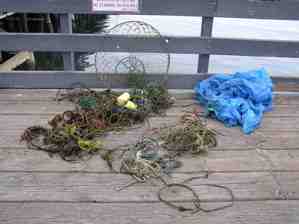 Thanks to a new university project, the sight of gulls or pelicans with fishing hooks in their mouths or fishing line wrapped around their legs will be less common on California beaches. Beginning this week, the California Lost Fishing Gear Recovery Project at the University of California Davis is commencing a yearlong effort to remove discarded fishing hooks and slice tangled lines from pier pilings, and establish fishing-line recycling stations to make the coastal ocean safer for wildlife as well as people.
Thanks to a new university project, the sight of gulls or pelicans with fishing hooks in their mouths or fishing line wrapped around their legs will be less common on California beaches. Beginning this week, the California Lost Fishing Gear Recovery Project at the University of California Davis is commencing a yearlong effort to remove discarded fishing hooks and slice tangled lines from pier pilings, and establish fishing-line recycling stations to make the coastal ocean safer for wildlife as well as people.
"Fishing-line-related injuries are a problem for many of our coastal wildlife species," said Kirsten Gilardi, executive director of the SeaDoc Society, a program of the UC Davis Wildlife Health Center. "Our goal is to remove as much of it as we can from around fishing piers, and then make it easy for anglers to dispose of their used hooks and line properly in the future."
From Santa Cruz to the Mexican border, trained volunteer scuba divers will use knives and shears to remove accumulated fishing line from the pilings at 16 public-access fishing piers. Working in close cooperation with the cities and ports that manage the piers and with local nonprofit organizations, SeaDoc will install custom bins at each pier to encourage anglers to discard their unwanted hooks and line in the bin instead of into the water. Collected monofilament will be recycled.
Crews will be cleaning up the Avila pier today and tackle the rest before June 2007. Locations include Santa Cruz, Goleta, Santa Monica, Manhattan Beach, Redondo Beach, San Pedro, Seal Beach, Huntington Beach, Newport Beach, San Clemente, Oceanside, Ocean Beach in San Diego and Imperial Beach. Monterey pier was where the project debuted on March 20.
To date, working closely with commercial fishermen, the California Lost Fishing Gear Recovery Project has retrieved nearly 10 tons of fishing gear from around the Channel Islands. The pier cleanups represent the project’s first efforts taking place on the mainland.
The $200,000 California Lost Fishing Gear Recovery Project is funded by the National Fish and Wildlife Foundation and the Marine Debris Program of the National Oceanic and Atmospheric Administration (NOAA). The project was established with grants from those organizations and by the California Ocean Protection Council and State Coastal Conservancy. Visit their Web site for more information.




















this is an excellent idea, i think that its really sad that all this wildlife dies because most people are to careless. But i am all about savingthe birds and wildlife.